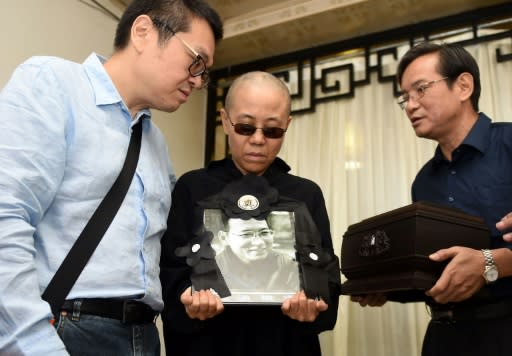Chinese laureate's widow willing to 'die at home' in protest

The widow of late Nobel laureate Liu Xiaobo said that after eight years of house arrest she was ready to "die at home" in protest at her continuing detention by Chinese authorities, a report said Wednesday. The poet Liu Xia, 57, has been under close police watch, despite facing no charges, since her husband was awarded the Nobel Peace Prize in 2010, a recognition that deeply angered the Communist regime. "It is easier to die than live. Using death to defy could not be any simpler for me," Liu recently told a friend in Germany, according to the US-based website China Change. Liao Yiwu, an exiled Chinese writer living in Berlin, said in a letter published by the human rights website that he was shocked to hear Liu's distress and urged her to "wait". With her permission, he also released an audio recording of an earlier phone call where Liu said that she was "ready to die" and that "if I'm dead, it'll all be done with". Liu Xiaobo was a veteran of the 1989 Tiananmen Square protests and was detained in 2008 after co-writing Charter 08, a petition calling for democratic reforms. He died in Chinese custody last July after authorities rejected his request to receive treatment abroad, becoming the first Nobel Peace laureate to die in custody since German pacifist Carl von Ossietzky, who passed away in a hospital while held by the Nazis in 1938. Liu Xia's friends told AFP she was taking medication for depression and had suffered from heart problems and fainting. AFP reporters have tried to visit Liu's home multiple times in recent years, but were blocked each time by plainclothes men. The United States and European Union have called on President Xi Jinping's government to free the widow and let her travel abroad. Last week, German ambassador to China Michael Clauss told the Hong Kong-based South China Morning Post that Liu would be welcomed in his country. "We hope that Liu Xia can finally enjoy freedom of movement and to travel wherever she desires. This has been a continuously stated concern of Germany for a long time already, just like the fact that she is welcomed to Germany if that remains her wish," Clauss said. On Monday, the French foreign ministry reiterated its appeal to Chinese authorities to "ensure the freedom of movement of Liu Xia as well as that of her family". Chinese foreign ministry spokeswoman Hua Chunying told a regular press briefing on Thursday that she did not have information on the situation. "But Liu Xia is a Chinese citizen. The relevant Chinese authorities will handle relevant issues in accordance with the law," Hua said. Amnesty International and other rights groups have also condemned authorities' treatment of the poet, who has always stayed out of politics. "She has never been accused or convicted of any crime, and the Chinese government has even said she is free to travel," Amnesty China researcher William Nee said Thursday. "The latest revelations about her depression show the urgency for the Chinese government to allow her to go abroad, and end the absurd pretence that she's free in China," Nee said. Liu Xia, the wife of late Nobel laureate Liu Xiaobo, has been kept under house arrest in China for years

